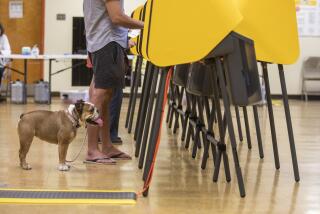The Message Matters, Not the Mouth : Serbia: Helping a democrat’s election campaign against unreconstructed communists is a test of American optimism.
- Share via
You can’t truly appreciate democracy unless you’ve experienced the opposite. I just did, by helping my friend Milan Panic, the Orange County businessman who became prime minister of Yugoslavia last July, in his campaign against hatchet man Slobodan Milosevic for president of Serbia.
What’s at stake in Serbia’s election next Sunday makes our recent U.S. election seem trivial. We only had to choose between “trickle-down” and “invest and grow.” Serbs will choose, literally, between war and peace, fear and hope. Their future depends on the outcome of this vote.
In a free and fair election, there would be no doubt. Peace and Panic would win. But with hard-line communists still controlling the election apparatus and the media, this is a free and fair election in name only.
The first challenge was getting Panic on the ballot. No sooner had Panic declared his candidacy than the Milosevic-appointed Electoral Commission declared him unfit to be president of Serbia, since he had not been in residence for the entire 12 months preceding the election.
As Panic pointed out, saying that the prime minister of Yugoslavia is unfit to be president of Serbia is like saying the President of the United States is unfit to be governor of Arkansas.
Besides, Panic was born in Belgrade, lived there for 25 years, owns one of the major factories in Serbia and has maintained an apartment in Belgrade since September, 1991.
But only a long series of court appeals--plus the threat of student demonstrations and an election boycott by all opposition parties--forced Milosevic to back down. Panic was finally certified for the ballot with only eight days left to campaign.
Next challenge: Getting Panic on the air. The only national television channel in Serbia is state-owned, state-controlled and state-censored. Its nightly TV newscast puffs up Milosevic and pummels Panic, and its advertising policy gives Panic no opportunity to strike back. In political commercials, candidates are not permitted to attack or criticize their opponent--or even to mention their opponent by name. And one man, Milosevic’s appointee, must approve all spots.
This is not my idea of a level playing field. Our initial script, which began innocently enough (“Two years ago, Slobodan Milosevic promised us things were going to get better”), was rejected. So was a softer “Two years ago, we were promised. . . .” In the end, we settled on the innocuous “Two years ago, we voted for. . . .”
Next problem: video. If we could not mention Milosevic’s name, could we at least show videotape of him making a speech to remind voters whom Panic was running against? How foolish of me to ask!
It was at this point that we figured out how to outwit the censor. We submitted our first commercial, complete with revised text, showing blown-up, slow-motion video of Milosevic’s easily-recognizable mouth. When the censor reacted in horror at this desecration--”You cannot show the president’s mouth without the president’s permission!”--we immediately handed him a second version, with a substitute mouth, a woman’s mouth. This confounded even their lack of logic, and the spot--mouth changed, message intact--was finally approved.
Next challenge: getting people to watch. Again, easier said than done.
Either through malice or mercy, Serb censors group all political commercials into six daily five-minute blocks of spots. As if that’s not bad enough, they virtually eliminate any chance of an audience by announcing ahead of time when the political commercial clusters will be shown. Imagine: “At 8:55 p.m., we will present five minutes of back-to-back political ads.” At 8:55 p.m., 2 million toilets in Belgrade simultaneously flush.
Still, I left Serbia feeling upbeat. We had beat the odds, getting Panic on the ballot. We had beat the censor, getting our TV spot on the air.
But as the bus was pulling out of Belgrade for the seven-hour drive to Budapest and my long flight back home, it occurred to me that democracy hadn’t conquered communism yet. There was one more obstacle left.
On Sunday, I wondered, who will count the votes?
More to Read
Sign up for Essential California
The most important California stories and recommendations in your inbox every morning.
You may occasionally receive promotional content from the Los Angeles Times.










